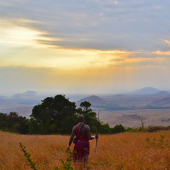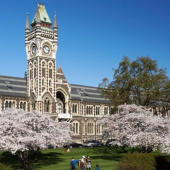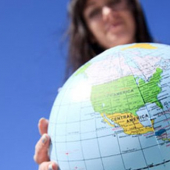Africa is made up of over 50 countries and is the world’s second largest and second most populous continent, making up 20% of the Earth’s total land mass and 16% of the world’s population. Yet students rarely think of Africa first when considering where to study abroad, which is a great shame, because the continent offers so much to so many, that so few take advantage of.
Some may have a pre-determined vision of what Africa is like, but each country is unique and beautiful in its own way. Africa is not just made up of jungle, or the plains, as it is so often presented in the media. There are beautiful ocean-side white beaches in Tanzania and Kenya, Mediterranean coastline in Egypt, Morocco and Tunisia, the more tempestuous Atlantic in Ghana and Senegal.
Cities like Lagos, Cairo, Nairobi, Cape Town and Johannesburg are thriving and growing with a burgeoning middle class as Africa on the whole grows and stabilises the economies that make up the landmass.
Most importantly, world class education is available in a vast number of colleges and universities in the continent. African universities are particularly well-renowned for medicine, politics, foreign languages, music, international relations and international development. Though, of course, every subject is available and dependent on the institution itself.
So which then, are the best places in Africa to study abroad?
South Africa
South Africa is famous for its stunning natural scenery, making it one of the most popular choices for those with an explorative streak. There is the picturesque coastline of the Garden Route, safaris in Kruger National Park, trekking in the Drakensberg Mountains, exploring the wetlands or the marine reserves of the eastern coast. The list goes on.
The country’s major cities like Cape Town, Johannesburg, Durban and Pretoria offer vivid nightlife and sporting opportunities, especially for football, cricket and rugby. And if you get tired of all of that, a relaxing barbecue with friends is never far off.
Universities in South Africa are split into three types: traditional, which are your typical academic universities; technikons, or vocational universities of technology; and comprehensive, which are a combination of the previous two.
Some of the highest rated universities in the country include the University of Cape Town, Stellenbosch University and the University of the Witwatersrand.
If you study in South Africa, a bachelor’s degree usually lasts three years of full-time study and a master’s degree two years. The school year begins in early February with the first semester ending in early June. The second semester lasts from mid-July to late November.
Kenya
Kenya is best known for its safaris, beautiful wildlife reserves and national parks, including the Maasai Mara, West Tsavo National Park, Lake Nakuru National Park and Aberdares National Park. The country is home to the lion, the leopard, the buffalo, the rhino and the elephant, which adds to its reputation as the home of wildlife.
But in Kenya, you can spend time in both wildlife-rich savannah grassland and modern urban culture, Nairobi, the capital, in particular.
Since Kenya is located on the Earth’s equator, it has a very warm and humid climate. However, it is a little cooler around Nairobi, which is home to seven university campuses alone.
Kenya is made up of a unique blend of cultures that include Swahili on the coast, Bantu communities in the central and western regions and Nilotic communities in the northwest. Also well-known is the Maasai tribe, whose body decoration is often what people imagine when thinking of Kenya.
There are over 10 public universities and more than 20 private universities in Kenya and the primary language used is English. The academic year is Western styled, running from September to June. A Bachelor’s degree is typically four to six years long and they often end with a research project. The University of Nairobi is the most renowned in the country, followed by Kenyatta University, Egerton University and Moi University.
Kenya’s economy is one of the strongest in Africa, with major industries including agriculture, oil, aluminium, steel, lead, cement and tourism.
Senegal
Whereas Kenya might be more appropriate for English speakers, or at least those that want to improve their English, Senegal is certainly a choice for French speakers.
Located in Western Africa, between Mauritania and Guinea-Bissau, Senegal borders the Atlantic Ocean and is warm and humid throughout the year, with a rainy season from May to November.
Like much of Africa, the local culture is very energetic and colourful, surrounded by a beautiful landscape, with beaches, creeks, plains and the Senegal River flowing from the east to the north.
Many people in Senegal live low-cost lifestyles, often growing their own food. If were to choose to live such a way, your stay in Senegal would be very cheap indeed. Otherwise, there does remain the option to live in larger apartments and to eat out and take taxis and so forth, but do bear in mind this will raise costs a little.
Although apprenticeships are common in Senegal, there are a number of universities available, both public and private. In Dakar, the capital city, for example, there is Cheikh Anta Diop University, Suffolk University Dakar Campus, University du Sahel and Dakar Bourguiba University.
Some of the most popular courses available in Senegal include law, political science, medicine, arts and humanities, science and technology, economics and management.
Career programs last between two and four years, with an additional 18 months to two years for degree programs. However, there are opportunities to complete degrees faster, both via personal work and fast-track programs.
The school year begins in October and lasts until July and though students pay tuition, room and board, the costs are significantly less than in a European or North American school. If you decide to stay after graduation, there are plenty of economic opportunities available, like tele-services, healthcare, farming, fishing and tourism.
Egypt
Renowned worldwide for the pyramids, Sphinx and River Nile, Egypt is so much more than these well-known tourist attractions. Egypt has been a cornerstone of the Arab world for thousands of years, overflowing with culture and life ever since. Events such as Abu Simbel Sun Festival and the Islamic holy festival of Eid attracts people travelling from around the world.
Egypt’s capital Cairo is one of the most populous cities in the globe and is of great social and political significance. It is busy but students staying in the city will find little pockets of solace for their own, alongside cultural touchstones such as the Cairo Opera House, the Cairo International Film Festival and Egyptian Museum.
Just opposite the city, across the Nile, is the University of Cairo whose main campus is in Giza, that of the pyramids and Sphinx fame.
Egypt is a nation of unparalleled history, with civilisation arising there in 3100BC and remaining the dominant force for almost three millennia more. The Library of Alexandria was a global educational centre during that period and though it no longer stands, the University of Alexandria remains true to the educational principles of the library.
Egypt has 20 public universities and 23 private universities, with around two million students in total. Some of the top universities in the country include the American University in Cairo, Cairo University, Ain Shams University, Alexandria University and Mansoura University.
Ghana
The gateway to Africa: Ghana is known for its strong economy, safe streets and accessibility.
Located in West Africa, Ghana is a growing nation and presents an intriguing option for students that want a diverse and strongly academic environment in which to study. It is also home to some of the friendliest people on the planet.
Ghana has secluded, palm tree lined beaches, a strong democracy and a rich diversity of cultures. The climate is tropical, meaning warm and occasionally damp. The two biggest cities are Accra, the capital, and Kumasi- more traditional than the modern and bustling Accra.
Ghana’s official language is English and so university and college courses are taught in that language. So by studying in Ghana, you can improve your knowledge and English skills, while coming to appreciate your beautiful surroundings at the same time. It’s certainly a lot prettier than the United Kingdom, in any case.
Ghana is home is home to lots of accredited, degree-granting colleges and universities, including specialist higher education institutions, like the National Film and Television Institute in Accra and the Ghana Institute of Management and Public Administration in Legon. The top ranked university in the country is the University of Ghana, alongside the also highly rate Kwame Nkrumah University of Science and Technology and the University of Education.
Tunisia
Tunisia is the most northern country in Africa, as well as the smallest, and borders Algeria, Libya and the Mediterranean Sea. Its location leads to a unique blend of Arab, African and European culture for a provocative study abroad experience.
Tunisia is replete with beautiful and intriguing environments, cities and villages with domed buildings, tall archways and bustling squares. Vast Saharan dunes provide a backdrop for many of Tunisia’s cities, in which cosy narrow streets blend with wide expansive squares. Some of Tunisia’s intriguing sights include El Djem Amphitheatre, the Grand Erg Oriental and the Sidi Bou Said village, just to name a few.
Higher education in Tunisia has developed rapidly of late, with students more than tripling since the late 1990s. There are over 170 institutions of higher education in the country- universities, higher institutes of technological studies and higher institutes of teachers’ training.
Tunisia is very affordable, especially compared to Europe and isn’t far from countries such as Italy or Greece. Diplomas awarded by Tunisian institutes are also recognised worldwide.
The primary language is Arabic, though French is also commonly spoken there and although a variety of courses are available, there are few places that are better suited for studying those languages, International Policy and Diplomacy or Middle Eastern Studies.
If you are considering studying in Tunisia, your first port of call will be the academic and cultural capital, Tunis. Tunis is home to the most well-known universities in the country, like Tunis University and Tunis El Manar University.
Uganda
Uganda is not a country usually found at the top of most students’ preferred study destinations, but it offers fantastic opportunities for an international education. Among other things, it is inexpensive, beautiful and a thoroughly fascinating places to spend your time.
Education institutions in Uganda do not generally provide a traditional experience, as most study time will be spent in the field, exposing students to real world examples of what they are studying. So where in Uganda you choose to study will have a big impact on your education.
Kampala is the largest city in Uganda and its capital. It has a long rich multicultural and multi-faith history. With many political and social organisations based in the city, it’s the perfect place for humanitarian and political students. For those who like living in busy cities, Jinja is also popular as it is home to the Nile River- with wonderful food and coffee available everywhere.
Kabale is smaller and close to the jungles in which Uganda’s famous gorillas live. As it is more remote, it being high in the mountains, Kabale is for students that would prefer a more authentic and immersive Ugandan experience.
Some of the best universities in Uganda include: Makerere University, Uganda Christian University and the Mbarara University of Science and Technology.
Uganda is also an excellent place to study public health as it is a country with some excellent public health care, though also lacking in more rural areas. So by studying healthcare, you can not only improve your knowledge and skills, you can also make a real world difference as you do so.
The official languages are English and Swahili and if you are looking to sharpen your English, it’s a great place to do so as you can negotiate with locals for all of your purchases down from an already affordable start point.










